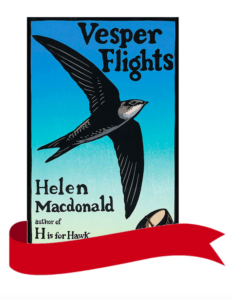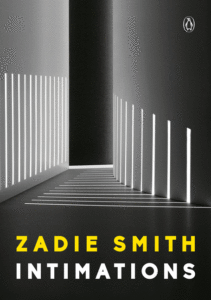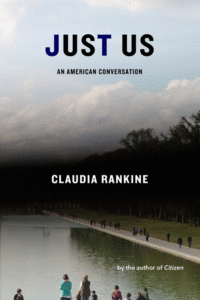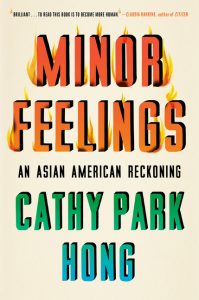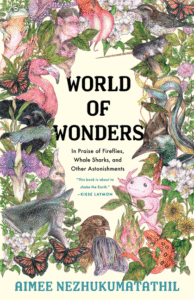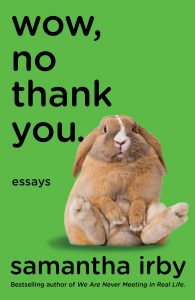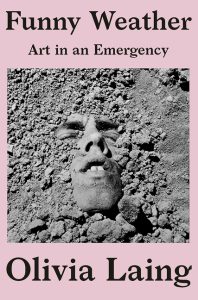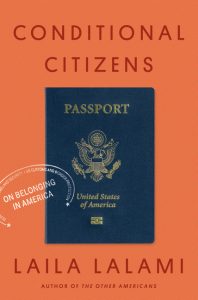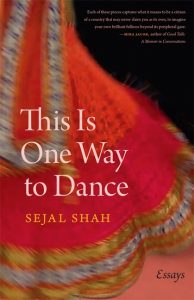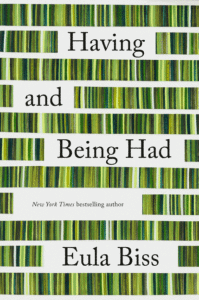
The Best Reviewed Essay Collections of 2020
Featuring Zadie Smith, Helen Macdonald, Claudia Rankine,
Samantha Irby, and more
Zadie Smith’s Intimations, Helen Macdonald’s Vesper Flights, Claudia Rankine’s Just Us, and Samantha Irby’s Wow, No Thank You all feature among the Best Reviewed Essay Collections of 2020.
Brought to you by Book Marks, Lit Hub’s “Rotten Tomatoes for books.”
*
1. Vesper Flights by Helen Macdonald
(Grove)
18 Rave • 3 Positive • 1 Mixed
Read Helen Macdonald on Sherlock Holmes, Ursula Le Guin, and hating On the Road here
“A former historian of science, Macdonald is as captivated by the everyday (ants, bird’s nests) as she is by the extraordinary (glowworms, total solar eclipses), and her writing often closes the distance between the two … Always, the author pushes through the gloom to look beyond herself, beyond all people, to ‘rejoice in the complexity of things’ and to see what science has to show us: ‘that we are living in an exquisitely complicated world that is not all about us’ … The climate crisis shadows these essays. Macdonald is not, however, given to sounding dire, all-caps warnings … For all its elegiac sentences and gray moods, Vesper Flights is a book of tremendous purpose. Throughout these essays, Macdonald revisits the idea that as a writer it is her responsibility to take stock of what’s happening to the natural world and to convey the value of the living things within it.”
–Jake Cline (The Washington Post)
2. Intimations by Zadie Smith
(Penguin)
13 Rave • 7 Positive • 3 Mixed
Listen to Zadie Smith read from Intimations here
“Smith…is a spectacular essayist—even better, I’d say, than as a novelist … Smith…get[s] at something universal, the suspicion that has infiltrated our interactions even with those we want to think we know. This is the essential job of the essayist: to explore not our innocence but our complicity. I want to say this works because Smith doesn’t take herself too seriously, but that’s not accurate. More to the point, she is willing to expose the tangle of feelings the pandemic has provoked. And this may seem a small thing, but it’s essential: I never doubt her voice on the page … Her offhandedness, at first, feels out of step with a moment in which we are desperate to feel that whatever something we are trying to do matters. But it also describes that moment perfectly … Here we see the kind of devastating self-exposure that the essay, as a form, requires—the realization of how limited we are even in the best of times, and how bereft in the worst.”
–David L. Ulin (The Los Angeles Times)
3. Just Us: An American Conversation by Claudia Rankine
(Graywolf)
11 Rave • 6 Positive • 5 Mixed
Read an excerpt from Just Us here
“Just Us is about intimacy. Rankine is making an appeal for real closeness. She’s advocating for candor as the pathway to achieving universal humanity and authentic love … Rankine is vulnerable, too. In ‘lemonade,’ an essay about how race and racism affect her interracial marriage, Rankine models the openness she hopes to inspire. ‘lemonade’ is hard to handle. It’s naked and confessional, deeply moving and, ultimately, inspirational … Just Us, as a book, is inventive … Claudia Rankine may be the most human human I’ve ever encountered. Her inner machinations and relentless questioning would exhaust most people. Her labor should be less necessary, of course.”
–Michael Kleber-Diggs (The Star Tribune)
4. Minor Feelings: An Asian American Reckoning by Cathy Park Hong
(One World)
7 Rave • 10 Positive • 2 Mixed
Listen to an interview with Cathy Park Hong here
“Hong’s metaphors are crafted with stinging care. To be Asian-American, she suggests, is to be tasked with making an injury inaccessible to the body that has been injured … I read Minor Feelings in a fugue of enveloping recognition and distancing flinch … The question of lovability, and desirability, is freighted for Asian men and Asian women in very different ways—and Minor Feelings serves as a case study in how a feminist point of view can both deepen an inquiry and widen its resonances to something like universality … Hong reframes the quandary of negotiating dominance and submission—of desiring dominance, of hating the terms of that dominance, of submitting in the hopes of achieving some facsimile of dominance anyway—as a capitalist dilemma … Hong is writing in agonized pursuit of a liberation that doesn’t look white—a new sound, a new affect, a new consciousness—and the result feels like what she was waiting for. Her book is a reminder that we can be, and maybe have to be, what others are waiting for, too.”
–Jia Tolentino (The New Yorker)
5. World of Wonders: In Praise of Fireflies, Whale Sharks, and Other Astonishments by Aimee Nezhukumatathil
(Milkweed Editions)
11 Rave • 3 Positive
Read an excerpt from World of Wonders here
“In beautifully illustrated essays, poet Aimee Nezhukumatathil writes of exotic flora and fauna and her family, and why they are all of one piece … In days of old, books about nature were often as treasured for their illustrations as they were for their words. World of Wonders, American poet and teacher Aimee Nezhukumatathil’s prose ode to her muses in the natural world, is a throwback that way. Its words are beautiful, but its cover and interior illustrations by Fumi Mini Nakamura may well be what first moves you to pick it up in a bookstore or online … The book’s magic lies in Nezhukumatathil’s ability to blend personal and natural history, to compress into each brief essay the relationship between a biographical passage from her own family and the life trajectory of a particular plant or animal … Her kaleidoscopic observations pay off in these thoughtful, nuanced, surprise-filled essays.”
–Pamela Miller (The Star Tribune)
6. Wow, No Thank You by Samantha Irby
(Vintage)
10 Rave • 3 Positive • 1 Mixed
Watch an interview with Samantha Irby here
“Haphazard and aimless as she claims to be, Samantha Irby’s Wow, No Thank You is purposefully hilarious, real, and full of medicine for living with our culture’s contradictory messages. From relationship advice she wasn’t asked for to surrendering her cell phone as dinner etiquette, Irby is wholly unpretentious as she opines about the unspoken expectations of adulting. Her essays poke holes and luxuriate in the weirdness of modern society … If anyone whose life is being made into a television show could continue to keep it real for her blog reading fans, it’s Irby. She proves we can still trust her authenticity not just through her questionable taste in music and descriptions of incredibly bloody periods, but through her willingness to demystify what happens in any privileged room she finds herself in … Irby defines professional lingo and describes the mundane details of exclusive industries in anecdotes that are not only entertaining but powerfully demystifying. Irby’s closeness to financial and physical precariousness combined with her willingness to enter situations she feels unprepared for make us loyal to her—she again proves herself to be a trustworthy and admirable narrator who readers will hold fast to through anything at all.”
–Molly Thornton (Lambda Literary)
7. Funny Weather: Art in an Emergency by Olivia Laing
(W. W. Norton & Company)
5 Rave • 10 Positive • 3 Mixed • 1 Pan
“Yes, you’re in for a treat … There are few voices that we can reliably read widely these days, but I would read Laing writing about proverbial paint drying (the collection is in fact quite paint-heavy), just as soon as I would read her write about the Grenfell Tower fire, The Fire This Time, or a refugee’s experience in England, The Abandoned Person’s Tale, all of which are included in Funny Weather … Laing’s knowledge of her subjects is encyclopaedic, her awe is infectious, and her critical eye is reminiscent of the critic and author James Wood … She is to the art world what David Attenborough is to nature: a worthy guide with both a macro and micro vision, fluent in her chosen tongue and always full of empathy and awe.”
–Mia Colleran (The Irish Times)
8. Conditional Citizens: On Belonging in America by Laila Lalami
(Pantheon)
6 Rave • 7 Positive • 1 Mixed • 2 Pan
“A] searing look at the struggle for all Americans to achieve liberty and equality. Lalami eloquently tacks between her experiences as an immigrant to this country and the history of U.S. attempts to exclude different categories of people from the full benefits of citizenship … Lalami offers a fresh perspective on the double consciousness of the immigrant … Conditional citizenship is still conferred on people of color, women, immigrants, religious minorities, even those living in poverty, and Lalami’s insight in showing the subtle and overt ways discrimination operates in so many facets of life is one of this book’s major strengths.”
–Rachel Newcomb (The Washington Post)
9. This is One Way to Dance by Sejal Shah
(University of Georgia Press)
7 Rave • 2 Positive
Watch an interview with Sejal Shah here
“Shah brings important, refreshing, and depressing observations about what it means to have dark skin and an ‘exotic’ name, when the only country you’ve ever lived in is America … The essays in this slim volume are engaging and thought-provoking … The essays are well-crafted with varying forms that should inspire and enlighten other essayists … A particularly delightful chapter is the last, called ‘Voice Texting with My Mother,’ which is, in fact, written in texts … Shah’s thoughts on heritage and belonging are important and interesting.”
–Martha Anne Toll (NPR)
10. Having and Being Had by Eula Biss
(Riverhead)
5 Rave • 4 Positive • 4 Mixed
Read Eula Biss on the anticapitalist origins of Monopoly here
“… enthralling … Her allusive blend of autobiography and criticism may remind some of The Argonauts by Maggie Nelson, a friend whose name pops up in the text alongside those of other artists and intellectuals who have influenced her work. And yet, line for line, her epigrammatic style perhaps most recalls that of Emily Dickinson in its radical compression of images and ideas into a few chiseled lines … Biss wears her erudition lightly … she’s really funny, with a barbed but understated wit … Keenly aware of her privilege as a white, well-educated woman who has benefited from a wide network of family and friends, Biss has written a book that is, in effect, the opposite of capitalism in its willingness to acknowledge that everything she’s accomplished rests on the labor of others.”
–Ann Levin (Associated Press)
*
The Book Marks System:
RAVE = 5 points • POSITIVE = 3 points • MIXED = 1 point • PAN = -5 points
Book Marks
Visit Book Marks, Lit Hub's home for book reviews, at https://bookmarks.reviews/ or on social media at @bookmarksreads.









